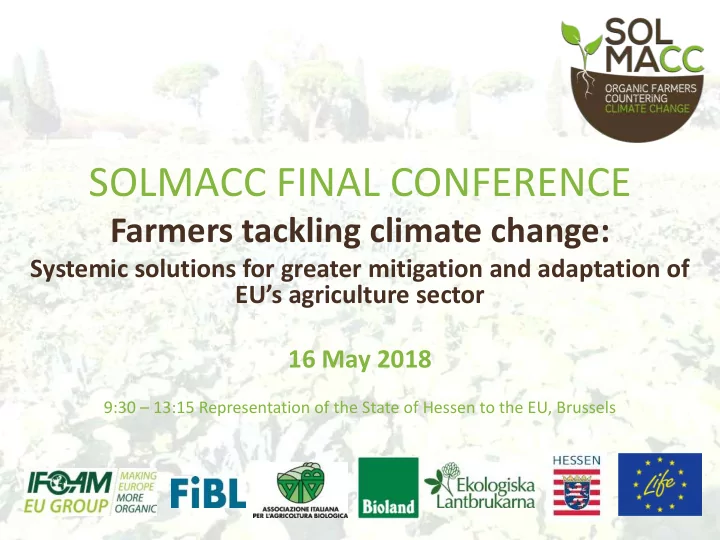

SOLMACC FINAL CONFERENCE Farmers tackling climate change: Systemic solutions for greater mitigation and adaptation of EU’s agriculture sector 16 May 2018 9:30 – 13:15 Representation of the State of Hessen to the EU, Brussels
Part II Policy recommendations for greater climate change mitigation and adaptation of EU’s agriculture sector (based on SOLMACC results) Eric Gall, Policy Manager and Deputy Director, IFOAM EU
The direct share of agriculture in GHG emissions Source: Eurostat, Greenhouse gas emissions by economic activity, EU-27, 2012
Non CO2 emissions from the agriculture sector Source: FAO Statistics Division, Agriculture, Forestry and Other Land Use, Emissions by Sources and Removals by Sinks, Trends 1990-2011
The direct and indirect GHG emissions from agriculture Source: Greenpeace, Cool Farming: Climate impacts of agriculture and mitigation potential
43-57% of emissions linked to the food system Source: the 43%-57% estimates, which are published in the United Nations Conference on Trade and Development ‘s 2013 Trade and Environment Review , look at food production more broadly to also include emissions from land-use change and deforestation, as well as the processing, packaging, transport and sale of agricultural products.
RECOMMENDATIONS 1. A better integration of agriculture into climate change policies • Set up long-term national and regional plans to 2050 for climate action in the agriculture sector • Maintain a high level of ambition for the implementation of the Paris Agreement and for climate action in the agriculture sector at European and national level • Set up sub-targets for the food and agriculture sector, both for 2030 and 2050
2. A better integration of climate change policies in agriculture and food sectors • National strategies for agriculture and food, compatible with long-term decarbonisation strategies • Action should be taken by the whole food industry • Reframe the “food security” narrative in sustainability perspective and include environmental and climate objectives in official messages targeted at the agriculture and food sectors • Communicate the benefits of adaptation to farmers to climate change, such as soil health and economic benefits of climate-friendly farming practices
3. Adopt a system-wide and multi- objective approach • Adopt a multi-objective approach to reduce GHG emissions from food production and to transition towards sustainable food systems • Establish a national inventory of emissions to take into account indirect emissions and emissions linked to consumption • Develop methods for the optimal assessment of multi- functional farming systems • Take into account the socio-economic benefits of transforming the agri-food system
4. Trigger a transformation of livestock production • Establish sustainable levels of livestock production • Reduce feed imports from unsustainable production systems • Support sustainable grazing on well-managed grasslands • Promote sustainable diets and demand side measures
5. Trigger a transition of the food system towards agroecology • Fund a flagship research programme on agroecology • Establish National Organic Action Plans to develop organic farming • Promote agricultural practices based on agroecological principles
6. Transform the CAP and make it fit for environment and climate action • Strengthen support for sustainable farming practices that provide public goods • Fully involve environmental authorities and civil society in the reform and implementation of the CAP
Thank you for your attention! SOLMACC is supported by the LIFE programme (agreement number: LIFE12 ENV/SE/000800). The sole responsibility for the content in this presentation lies with the presenter and the communication reflects only the presenter’s view. The European Commission is not responsible for any use that maybe be made of the information provided. www.solmacc.eu
Recommend
More recommend